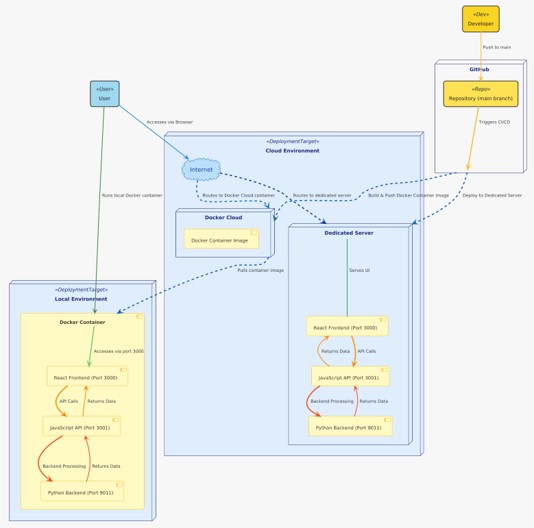Deployment Overview
Deployment Overview
Section titled “Deployment Overview”The API Threat Assessment Tool (AT-AT) system is deployed using a multi-environment container-based strategy. It is designed to support both local development and production-grade cloud environments. The deployment process involves pushing Docker container images to cloud-based infrastructure via GitHub CI/CD pipelines.
Deployment Diagram
Section titled “Deployment Diagram”
Environments
Section titled “Environments”Local Development
Section titled “Local Development”- Developer runs the frontend, API layer, and backend processor via local Docker containers.
- Services are exposed on:
- React Frontend: Port
3000 - JavaScript API: Port
3001 - Python Backend: Port
9011
- React Frontend: Port
- Data is exchanged using HTTP and JSON between these services.
Cloud Deployment
Section titled “Cloud Deployment”- Docker image is built and pushed to a container registry (e.g., DockerHub or GitHub Container Registry) via GitHub CI/CD.
- Containers are deployed to a dedicated server within a cloud environment.
- Components run on similar ports as in local setup and are exposed through secure routes.
- Environment variables (via
.env) configure service interconnections.
GitHub & CI/CD Flow
Section titled “GitHub & CI/CD Flow”- Developer pushes to the
mainbranch on GitHub. - GitHub Actions trigger a CI/CD workflow:
- Linting and tests are performed.
- Backend and API Docker images are built and published.
- The cloud server pulls the latest image and redeploys the service.
Deployment Targets
Section titled “Deployment Targets”<<device>>User: Accesses the platform via web browser.<<deploymentTarget>>Local Docker container: For development and testing.<<deploymentTarget>>Cloud server: Hosts production services.<<repo>>GitHub Repository: Central codebase that triggers CI/CD.
Stereotype Labels
Section titled “Stereotype Labels”<<deploymentTarget>>Cloud Environment / Local Environment<<artifact>>Docker Container Image<<component>>React Frontend, JS API Layer, Python Backend<<device>>User’s browser/device
Note: Refer to the
install.mdfor detailed steps on launching each environment.